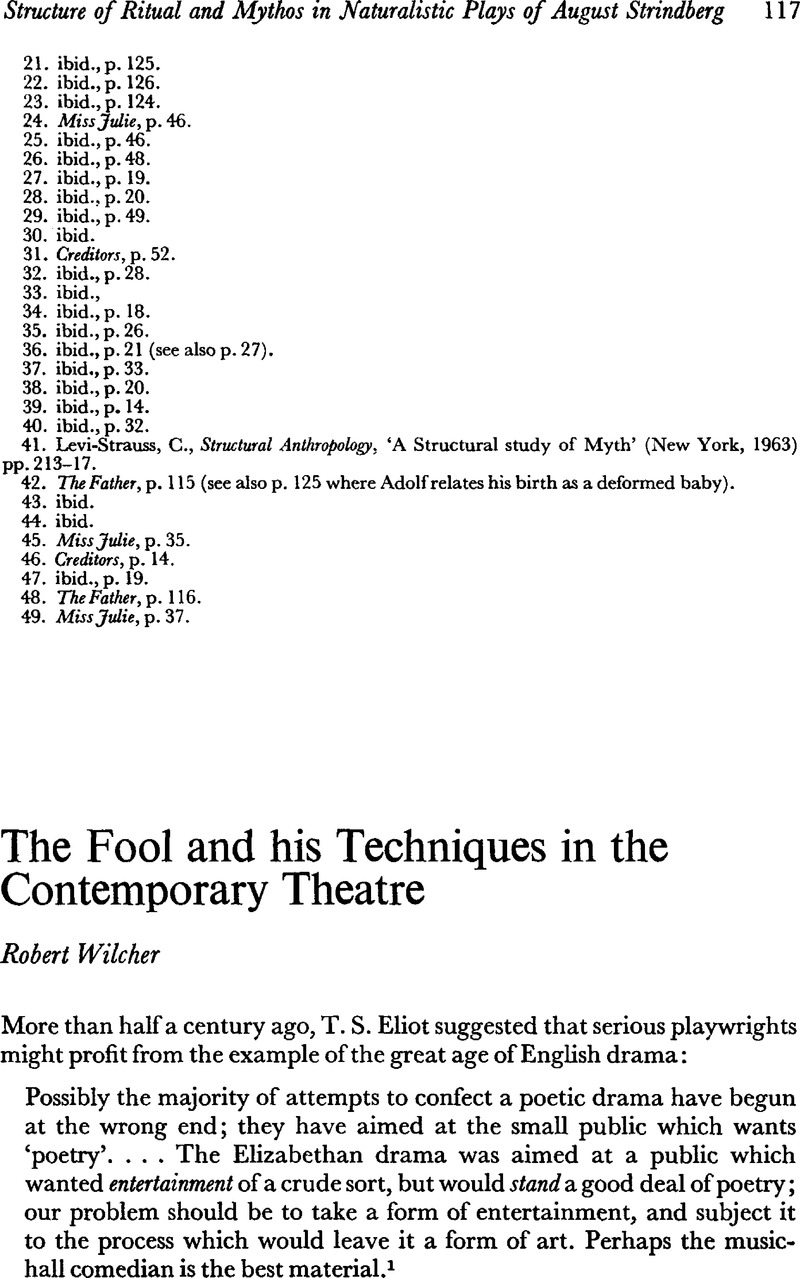No CrossRef data available.
Article contents
The Fool and his Techniques in the Contemporary Theatre
Published online by Cambridge University Press: 23 January 2009
Abstract

- Type
- Articles
- Information
- Copyright
- Copyright © International Federation for Theatre Research 1979
References
Notes
1. Eliot, T. S., The Sacred Wood (1920) (London, 1960), p. 70.Google Scholar
2. Bethell, S. L., Shakespeare and the Popular Dramatic Tradition (London, 1944), p. 29.Google Scholar
3. ibid., pp. 17 & 38.
4. ibid., pp. 24–5.
5. See, for example, Busby, Olive Mary, Studies in the Development of the Fool in the Elizabethan Drama (London, 1923)Google Scholar; Welsford, Enid, The Fool: His Social and Literary History (1935) (London, 1968)Google Scholar; Goldsmith, Robert Hillis, Wise Fools in Shakespeare (Liverpool, 1958)Google Scholar; Somerset, J. A. B., The Comic Turn in English Drama: 1470–1616 (1966) (unpublished Ph.D. dissertation, The Shakespeare Institute, University of Birmingham)Google Scholar; Bradbrook, M. C., ‘The New Clown: Twelfth Night’, Shakespeare the Craftsman (London, 1969)Google Scholar; Evans, Gareth Lloyd, ‘Shakespeare's Fools: The Shadow and the Substance of Drama’, Shakespearian Comedy, Stratford-upon Avon Studies 14 (London, 1972).Google Scholar Other studies which take up aspects of the fool tradition include Hotson, Leslie, Shakespeare's Motley (London, 1952)Google Scholar; Empson, William, ‘Fool in Lear’, Sewanee Review, LVII (1949), 177–214Google Scholar; Ellis, Roger, ‘The Fool in Shakespeare: A Study in Alienation’, Critical Quarterly, X (1968), 245–68.CrossRefGoogle Scholar
6. Willeford, William, The Fool and His Sceptre: A Study in Clowns and Jesters and their Audience (London, 1969), p. 13.Google Scholar
7. See two articles by Wright, Louis B., ‘Variety Entertainment by Elizabethan Strolling Players’, J.E.G.P., XXVI (1927), 294–303Google Scholar; ‘Variety-Show Clownery on the Pre-Restoration Stage’, Anglia, LII (1928), 51–68.Google Scholar
8. For accounts of Robert Armin and Shakespeare's Court Jesters see Gray, Austin K., ‘Robert Armine, The Foole’, P.M.L.A., XLII (1927), 673–85Google Scholar; Lippincott, H. F., ‘King Lear and the Fools of Robert Armin’, Shakespeare Quarterly, XXVI (1975), 243–53CrossRefGoogle Scholar; Felver, Charles S., Robert Armin, Shakespeare's Fool: A Biographical Essay (Kent, Ohio, 1961).Google Scholar
9. Osborne, John, The Entertainer (1957) (London, 1961).Google Scholar All quotations are taken from this edition and page references are incorporated into the text.
10. See, for example, Taylor, John Russell, Anger and After: A Guide to the New British Drama (Harmondsworth, 1963), p. 46.Google Scholar
11. Quoted in Banham, Martin, Osborne, Writers and Critics (Edinburgh, 1969), p. 30.Google Scholar
12. Fisher, John, Funny Way to be a Hero, 2nd. ed. (St Albans, 1976), p. 23.Google Scholar
13. Trussler, Simon, The Plays of John Osborne: An Assessment (London, 1969), p. 64.Google Scholar
14. Davison, Peter, ‘Contemporary Drama and Popular Dramatic Forms’, Aspects of Drama and Theatre, ed. Stout, A. K. (Sydney, 1965), p. 154.Google Scholar
15. Styan, J. L., The Dark Comedy: The Development of Modern Comic Tragedy, 2nd ed. (Cambridge, 1968), p. 270.CrossRefGoogle Scholar
16. Willeford, p. 50.
17. John Arden: Three Plays (Harmondsworth, 1964).Google Scholar All quotations are taken from this edition and page references are incorporated into the text.
18. Nichols, Peter, The National Health or Nurse Norton's Affair (London, 1970).Google Scholar All quotations are taken from this edition and page references are incorporated into the text.
19. Taylor, John Russell, The Second Wave: British Drama for the Seventies (London, 1971), pp. 29–30.Google Scholar
20. Sypher, Wylie, ‘The Meanings of Comedy’, in Comedy: Meaning and Form, ed. Corrigan, Robert W. (San Francisco, 1965), p. 28.Google Scholar
21. Welsford, p. xi.
22. ibid., p. xi.
23. Griffiths, Trevor, Comedians (London, 1976).Google Scholar All quotations are taken from this edition and page references are incorporated into the text.
24. Sypher, , op. cit., pp. 51–2.Google Scholar
25. Davison, Peter, op. cit., p. 156.Google Scholar




